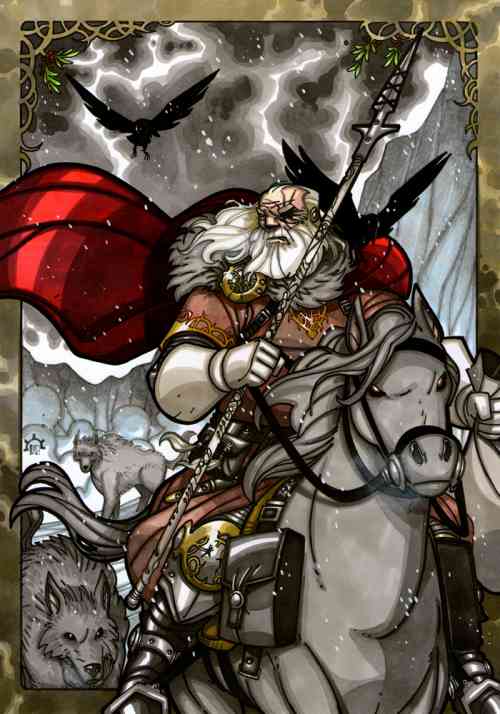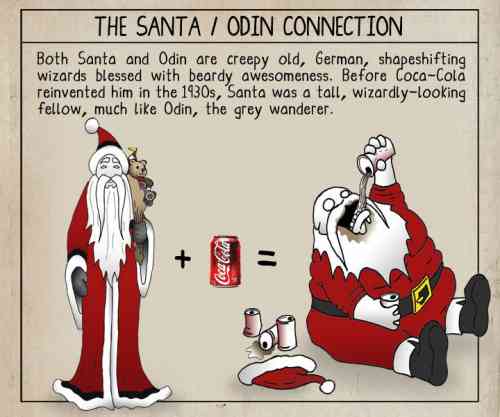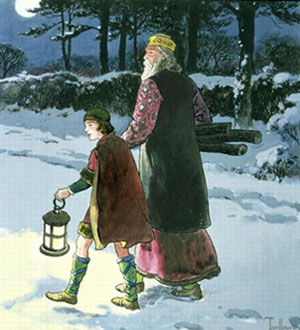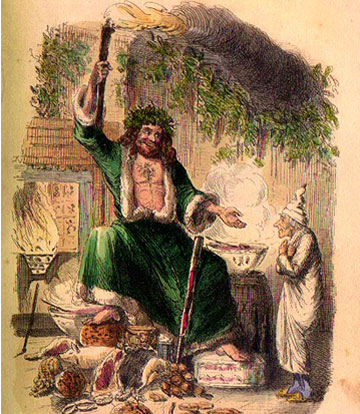Outside the Asylum


Naughty or Nice
It’s Yuletide, and this year I’m invoking one of my least favorite parts of the Christmas mythology.
I think of it as the Nicholas Spy Agency. Santa as the Deep State.
He sees you when you’re sleeping
He knows when you’re awake
He knows when you’ve been bad or good
So be good for goodness’ sake!
Now let me state at the outset that, though I have no children of my own, I’ve watched over small children many times in my life. Hence, I sympathize with the impulse that probably led to the writing and certainly led to the popularity of this song. Having a quick way to shut down a tantrum in the middle of the mall must seem like a godsend around Christmas—or any other time, really. The beauty of the idea is that it creates an incentive to the child not to blow a gasket basically year-round—and it deflects any irritation the child may feel at being asked to choose between the pleasure of toys and the pleasure of a temper tantrum onto a mythological being.
Like I said, in the middle of a crowded store, with a screaming five-year-old in tow, it must seem like a godsend.
And Bruce Springsteen did a spanking good version of the song:
But it’s an ugly idea nonetheless. Whether you take Santa back to his Christian or pagan origins, he is clearly a figure of generosity and kindness, especially to children. I believe, with no evidence whatsoever, that there is a third figure, along with St. Nicholas the Christian church father

and the god Odin riding Sleipnir through the midwinter night,


that goes into the makeup of Santa.

There seems to be a kind midwinter god of plenty, generosity and charity back there. You can see him in the King Wenceslas myth, where his kindness is extended not only to children, but to those made helpless by poverty. (The great thing about that story is that the saint not only embodies kindness himself, but gives strength and courage to other people so that they may persist in doing good.)
Sire, the night grows darker now
And the wind grows stronger
Fails my heart I know not how
I can go no longer
Mark my footsteps, my good page
Tread thou in them boldly,
Thou shalt find the winter’s rage
Freeze thy blood less coldly.
I think the same mythical fellow turns up in Charles Dickens’ A Christmas Carol as the Ghost of Christmas Present:

It was his own room. There was no doubt about that. But it had undergone a surprising transformation. The walls and ceiling were so hung with living green, that it looked a perfect grove; from every part of which, bright gleaming berries glistened. The crisp leaves of holly, mistletoe, and ivy reflected back the light, as if so many little mirrors had been scattered there; and such a mighty blaze went roaring up the chimney, as that dull petrification of a hearth had never known in Scrooge's time, or Marley's, or for many and many a winter season gone. Heaped up on the floor, to form a kind of throne, were turkeys, geese, game, poultry, brawn, great joints of meat, sucking-pigs, long wreaths of sausages, mince-pies, plum-puddings, barrels of oysters, red-hot chestnuts, cherry-cheeked apples, juicy oranges, luscious pears, immense twelfth-cakes, and seething bowls of punch, that made the chamber dim with their delicious steam. In easy state upon this couch, there sat a jolly Giant, glorious to see, who bore a glowing torch, in shape not unlike Plenty's horn, and held it up, high up, to shed its light on Scrooge, as he came peeping round the door.
`Come in.' exclaimed the Ghost. `Come in, and know me better, man.
To take the figure that embodies these qualities and turn him into an omniscient invisible judge who keeps lists that divide bad people from good is a pretty nasty cultural gesture. It introduces the idea of deserving things into what was once unfettered generosity—generosity that shone a light amid the darkness and privation of midwinter.
Have we not eaten while others starved? Will you condemn us for that? Will you praise us for the virtue of starving while others ate? Free your mind of the idea of deserving, the idea of earning, and you will begin to be able to think.
---Ursula LeGuin
The Dispossessed
I bring up the Nicholas Spy Agency because it’s struck me lately how much of our cultural discourse, and how much of our political discourse in particular, is driven by the desire to place blame. American politics is now little more than an argument over who’s at fault. I guess that’s what happens when politics abdicates its function of improving life for humanity and even abandons its obligation to administer the current system in as organized, rational, and fair manner as possible. Blame thrives in such a moral vacuum. When you abandon the notion of right action as a possibility, there’s little left but a moral Scylla and Charybdis to choose from. You can crash on the rocks by demonizing others, or get dragged down in a whirlpool of sociopathic nihilism. What else has the interminable Democratic primary been about?
At the same time, I guess I believe there is a place for blame; I certainly don’t think that people should simply be able to, as Arlo Guthrie once put it, burn women kids houses and villages, without any comment or remonstration from the rest of the human community. And when you talk about wrecking whole planets, it seems there must be some way of placing blame. Otherwise, the very idea that there’s anything wrong with taking a living planet and turning it into a dead one disappears. Can you have a notion of right and wrong without a notion of blame?
Maybe the problem comes when blame starts to run the show, when it becomes the sole currency of politics and the fundamental axis of relationship. Or maybe the problem comes from the fact that, unmoored from a real desire to improve the lives of human beings, blame becomes a distorted shadow of its former self. Or maybe the problem is that, in order to have a socially useful concept of blame, you must, at the very least, have a nodding acquaintance with accuracy and truth.
What do you think?
Whatever you think, I wish you all a good holiday season.


Comments
Good morning, all!
"More for Gore or the son of a drug lord--None of the above, fuck it, cut the cord."
--Zack de la Rocha
"I tell you I'll have nothing to do with the place...The roof of that hall is made of bones."
-- Fiver
Good morning, FLA sister.
Up before dawn here again, after my son opened our bedroom door to announce that he was hungry. Which has been the start of our days for a stretch of them lately.
I’ve never been an early riser and still find this demand, along with many others related to rearing kids especially at this age, really taxing. I’m naturally a night owl and the music life had fit like a glove. But those days are waning and I’m finding myself still adjusting.
As usual all of your essays pique in so many directions, but I can’t possibly say all I’d like when the kids are chomping at the bit to get out while it may be thawing today from a severe frigid spell.
As for Xmas we’ve kind of fell into my anti-consumerism perhaps a little too staunchly. I have a habit of being maybe a little too contrarian when I’m indignant about things, such as the sickening over-commercialization of the holidays.
So there’s no tree, no presents, no “mandatory gaiety” that Christopher Hitchens wryly noted. Just a plain old, deeply revered honoring of the winter hearth and slowing down of time, which I love. We play music, read, play, cook, and are gonna see friends and invite them over. Which is what we did for the boys’ in the home’s birthdays that just passed at the beginning of the month: a pizza party gathering with of a bunch of our Occupy activist friends for me, and the following morning bagels and coffee for our son, his friends and their parents.
Blame is the name of the game more so than ever, isn’t it? There was a piece I remember reading during 2015 that nailed an idea that has stuck with me (might have been in Pro Publica). It was the discovery in white rural and suburban working class areas that many are “resentment voters.” Folks who basically sneer and look down upon those beneath them as undeserving. Clearly adopting the propaganda of the very rich who don’t want to pay taxes and then use all that disposable money to pay people like Limbaugh and Fox clowns and the think tanks they cite that it’s unfair to tax the wealthy of their hard-earned money. So goddamn sad. Think Bernie’s been doing a lot thes past four years of movement building to help pull together a voting bloc of class consciousness that will hopefully supplant this insanity.
Best to you and Kate for the holidays. Hope she’s feeling better and you guys are adapting.
Love your pieces. Have been meaning to tell how brilliant the one recently was about incrementalism for Left ideas but things like the Patriot Act and other abominations get rushed through with no resistance.
Talk soon.
"If I should ever die, God forbid, let this be my epitaph:
THE ONLY PROOF HE NEEDED
FOR THE EXISTENCE OF GOD
WAS MUSIC"
- Kurt Vonnegut
How about the idea of lying?
We tell children they better not lie...and then we tell children to believe in a fictional Santa, Easter bunny, tooth fairy, etc. Plenty of hypocrisy to go around isn't there?
Well, I hope you all had/have a nice solstice (10:19 pm CST). That is a fact as opposed to Santa...and really is the root of all our holidays this season.
Thanks for the Santa story. I like your deep state analogy. Have a great holiday whichever one(s) you celebrate!
“Until justice rolls down like water and righteousness like a mighty stream.”
I tend to think of myths as being different from lies.
But that doesn't mean your point doesn't stand. Certainly many many parents encourage their kids to lie!
"More for Gore or the son of a drug lord--None of the above, fuck it, cut the cord."
--Zack de la Rocha
"I tell you I'll have nothing to do with the place...The roof of that hall is made of bones."
-- Fiver
I tend to think of myths as being different from lies.
But that doesn't mean your point doesn't stand. Certainly many many parents encourage their kids to lie!
"More for Gore or the son of a drug lord--None of the above, fuck it, cut the cord."
--Zack de la Rocha
"I tell you I'll have nothing to do with the place...The roof of that hall is made of bones."
-- Fiver
Everyone has to decide what is best for their kids...
but seems like it sets up a bad precedent to me...
https://www.fastcompany.com/3066049/convincing-your-kids-santa-is-real-i...
More about the parents entertainment than kids perhaps? Now if they teach Santa as a myth then that is truthful and a better approach IMO.
“Until justice rolls down like water and righteousness like a mighty stream.”
Related question: whether it is lying to teach children religion
Does G_d, Allah, etc. exist? Did Mohammed or Joseph Smith really get their marching orders directly from Him? Should one introduce the stories of Christmas, Hanukkah, etc. involving divine acts and miracles to children as if they actually happened, or does one already have to preface them with a disclaimer that such stories are feel-good group-identity “fake news”? What about the entire sacred scriptural traditions the stories are respectively rooted in?
I remember reading a popular Reader’s Digest level Cold War anti-communist propaganda item when I was a schoolkid. Supposedly, under the Soviet system, printings of the Old Testament / Torah would only be approved if, instead of Holy Bible or Torah they were titled “Legends of the Ancient Hebrews.”
I'm having some difficulty connecting to the site--
Everything seems very slow. That's why (I think) the repeat message.
So I may not be responding much this morning.
"More for Gore or the son of a drug lord--None of the above, fuck it, cut the cord."
--Zack de la Rocha
"I tell you I'll have nothing to do with the place...The roof of that hall is made of bones."
-- Fiver
Buenos mornin' CSTMS. As usual, much of value and much
to chew on. Thanks tons.
I've been having trouble with the site since early yesterday morn PST, fwiw. Johnny's up to sumthin' I think.
This, for starts, says much and also maybe not enough:
The whole idea of needing to earn things pervades and permeates our culture and is bogus as hell. If I can produce enough to keep 3 folks at an acceptable standard of living, it makes no sense to assert or believe that the other two must somehow earn their keep. I understand that if the work is alienating, unfulfilling, drudgery, then it would be more pleasant for me if the others could take a shift now and then to share the load - "g'morning Mr. Bossoverseer, I'm standing in for enhydra today, where's his desk/shovel/terminal/whatever", and our society would be much better if if could facilitate such behaviors and arrangements. With respect to Santa/xmas gifts, or birthdays, etc. it is even more sinister. I hate to go to the law for ethico-moral perspectives, but, in the US, at any rate, various bodies of law dealing with gifts and gifting pre-eminently emphasize that there is a donative intent that excludes any form or quid-pro-quo. If you earn a gift, it is compensation. If you earn it for actions that are not inherently of the nature of labor or work, then it must be a bribe, n'est ce pas? This is not a good state of affairs, not a part of our culture that we should perpetuate and promulgate and not something to teach our young. Beyond that, it leads to a sort of perverse petty jealousy that pervades our society. Ex: "I had to pay for my education, why should those little shits get a free ride?" (answer - and if it hurt ye not, why should you give a shit?) The concept and idea of spreading the wealth, joy, leisure and happiness vanishes. "Ah, but there will be exploiters if they don't have to toil for benefits" (again, so the fuck what? can we not afford it?) The idea of a "free ride" as a bad thing is a curse upon our society, everybody who thinks so should be compelled to spend a few years hitch-hiking. (Where are all those who babble about "pay it forward when it comes to everyday living as opposed to reacting to largess received?)
And BLAME. A profound point. We are a blaming society and we are none the better for it, especially the myriad forms of "blame and shame". We do need to assign responsibility, but that is a different matter. If order to correct errors, repair damage, and prevent recurrences, we need to understand who and what is responsible and why. "Algorithm" is becoming a dirty word and there is a grounds for that, but unless we act at random or upon whims, we are algorithmic animals. Analyzing decisions and processes in terms of responsibility allows us to ferret out what algorithms were applied at each stage of the decision and which ones led to the bad results. This in turn let's us better understand all the ramifications of the decision in order to better remedy the ill effects, but more importantly, it lets us determine what flaws in the algorithms applied need to be corrected, and what should be done instead in the future. Blame, on the other hand, is only beneficial for the purpose of meting out punishment, which is only a beneficial process if we can have a high degree of certainty that there is a value to said punishment. Restoration or reparation as punishment at least benefits those negatively impacted and may have an educational effect of the "perpetrator(s)", but generally, punishment is seen as a deterrent, and is ethically improper in the case of non-negligent mistakes and errors while being of highly questionable value as a deterrent in intentional cases when the matter is studies empirically.
Xmas is, btw, full of such wrinkles. The Magi are oft pointed to as a source of gifting and exemplars of good behavior. IF they were real, as portrayed by the predominant myth, they were superstitious folk who traveled a great distance to bestow valuable gifts upon one whom their superstitions had led them to devine would one day be "King of the Jews", a politically powerful person. Can this be viewed as other than some sort of bribe or lobbying? Were they at all generous to all the others, the hoi polloi they passed by and through on their journey? The record is silent, but we can guess.
Have a glorious solstice and may the spirit of Saturnalia be with you.
That, in its essence, is fascism--ownership of government by an individual, by a group, or by any other controlling private power. -- Franklin D. Roosevelt --
For the other side of the coin re-read “The Journey to the East”
by Hermann Hesse.
As a young man, the protagonist (an author avatar with the initials “H.H.”) was a musician and a mystic — a member of a secret lodge of “dropouts” from modern society, the mysterious “League” in which faith in all sorts of legends and ideals is encouraged.
Later, having become disillusioned, he returned to the more “practical” path of conventional life, symbolized by his having “sold his violin” . . .
It’s an iron rule: when the spiritual, mystical, mythical, and legendary are placed in the service of, and made subordinate to, economics and politics and war, bad things happen.